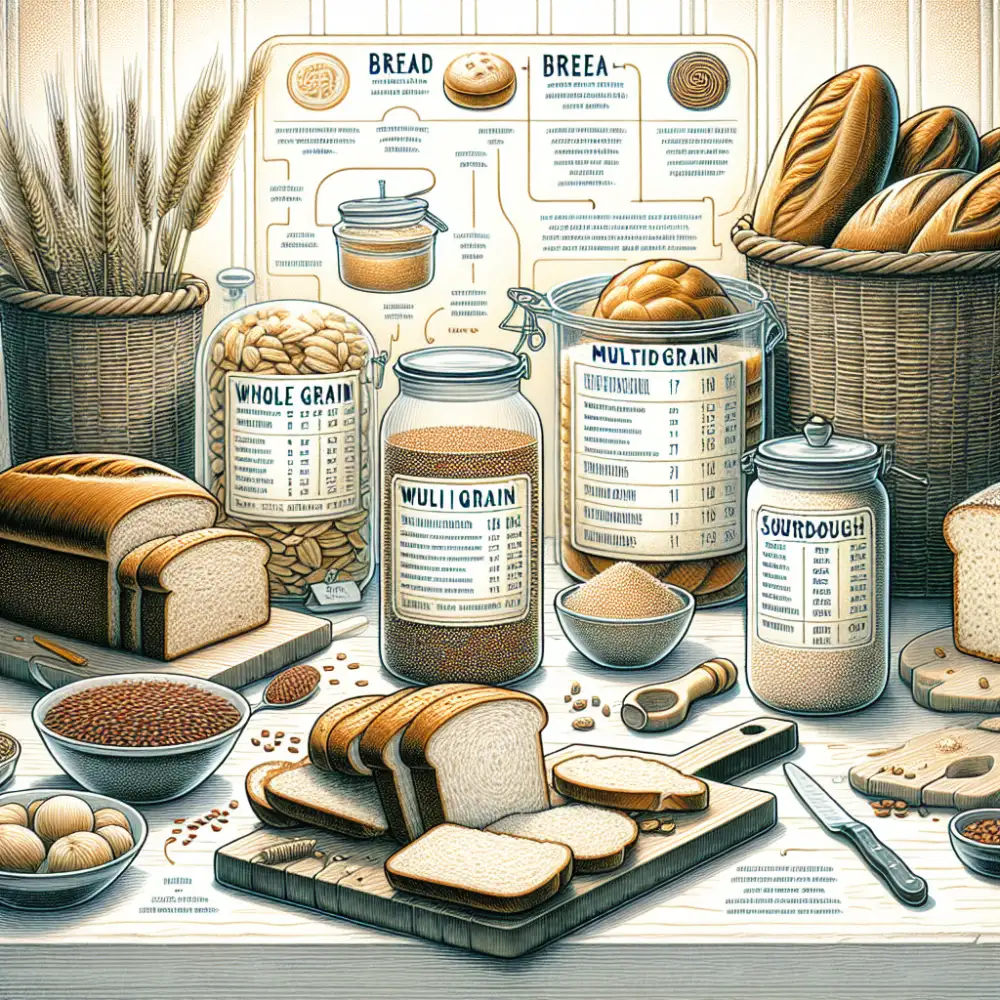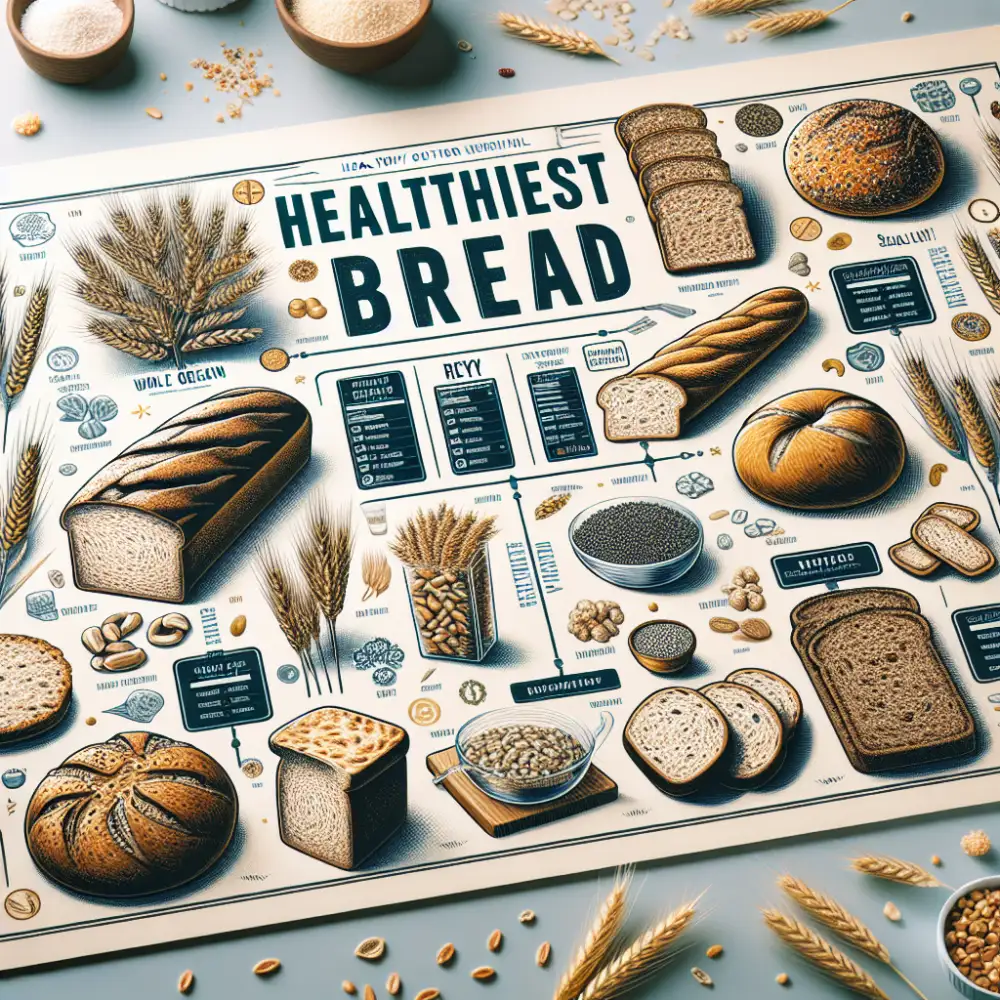Discover the Top Healthiest Bread Options for Your Wellness Journey

When it comes to making healthy choices in our diet, selecting the right kind of bread can play a significant role. Opting for healthier bread options can provide essential nutrients and benefits that contribute to overall well-being. From whole grain to sprouted grain, rye, sourdough, and gluten-free varieties, there are numerous options available that cater to different dietary needs and preferences. By understanding the unique qualities of each type of healthy bread, you can make informed decisions that align with your wellness goals. Let's explore some of the top healthiest bread options to enhance your culinary journey and promote a balanced lifestyle.
Whole Grain Bread: Packed with Fiber and Nutrients
Whole grain bread is a top choice for those seeking a healthy option. Unlike refined grains, whole grain bread retains all parts of the grain, including the bran and germ, which are rich in fiber and nutrients. Fiber aids in digestion, helps maintain a healthy weight, and reduces the risk of chronic diseases like heart disease and type 2 diabetes. Additionally, whole grain bread contains essential nutrients such as B vitamins, iron, magnesium, and selenium. Choosing whole grain bread over refined options can significantly boost your overall health and well-being.
Sprouted Grain Bread: Enhanced Nutrient Absorption
Sprouted grain bread is made from whole grains that have been allowed to sprout or germinate before being milled into flour. This process enhances the bread's nutrient content and makes it easier for our bodies to absorb these nutrients. Sprouting grains increases their levels of vitamins, minerals, and antioxidants, such as vitamin C, folate, fiber, and essential amino acids. Additionally, sprouting decreases the amount of antinutrients present in grains that can interfere with the absorption of minerals like iron and zinc. By choosing sprouted grain bread, you can boost your nutrient intake and support better overall health.
Rye Bread: Rich in Fiber and Low Glycemic Index
Rye bread is a nutritious option known for its rich fiber content and low glycemic index. High-fiber foods like rye bread can aid in digestion, promote satiety, and help regulate blood sugar levels. Rye bread contains a type of fiber called arabinoxylan which has been linked to various health benefits, including improved gut health and reduced risk of certain chronic diseases. Additionally, the lower glycemic index of rye bread means it causes a slower and steadier rise in blood sugar compared to white bread, making it a favorable choice for those looking to manage their blood sugar levels effectively.
Sourdough Bread: Gut-Friendly and Easier Digestion
Sourdough bread is a popular choice for its unique taste and potential health benefits. The fermentation process involved in making sourdough bread helps to break down gluten and phytic acid, making it easier to digest compared to other types of bread. This can be particularly beneficial for individuals with gluten sensitivities or digestive issues. Additionally, the lactic acid bacteria present in sourdough starter cultures may promote a healthy gut microbiome, which is essential for overall digestive health and immune function. By choosing sourdough bread, you can enjoy a gut-friendly option that supports easier digestion and potentially offers some added nutritional value compared to conventional bread varieties.

| Type of Bread | Fiber (g per serving) | Protein (g per serving) | Whole Grains (g per serving) |
|---|---|---|---|
| White Bread | 1-2 | 2-3 | 0-5 |
| Whole Wheat Bread | 3-5 | 3-4 | 15-20 |
| Rye Bread | 4-6 | 3-5 | 10-15 |
| Sourdough Bread | 2-4 | 3-4 | 5-10 (varies) |
Gluten-Free Bread: Suitable for Gluten Intolerant Individuals
Gluten-free bread is a suitable option for individuals who are gluten intolerant or have celiac disease. These bread varieties are made without wheat, barley, or rye, which contain gluten. Instead, they utilize alternative flours like rice flour, almond flour, or tapioca flour. Gluten-free bread can provide essential nutrients like fiber, vitamins, and minerals if they are enriched during production. It's crucial for those with gluten sensitivities to choose certified gluten-free products to avoid cross-contamination. By opting for gluten-free bread, individuals can still enjoy delicious and nutritious bread options while managing their gluten intolerance effectively.
In conclusion, choosing healthy bread options can significantly impact your overall wellness journey. By opting for whole grain, sprouted grain, rye, sourdough, or gluten-free bread, you can enhance your nutrient intake, improve digestion, and manage conditions like high blood sugar or gluten intolerance. These bread varieties offer a range of benefits from increased fiber content to easier digestion and gut-friendly properties. Making simple switches in your bread choices can pave the way for a healthier lifestyle and contribute to your well-being in the long run. So next time you reach for a loaf of bread, consider these healthier alternatives for a flavorful journey through food and recipes.

Published: 11. 03. 2024
Category: Food



